Off-program
Events, parties, exhibitions, debates…
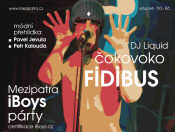 Big opening party
Big opening party
In program you will see prague groove/funk group Fidibus, women hiphop duo Čokovoko from Brno, DJ Liquid A, fashion show of fashion designers Pavla Jevuly a Petra Kaloudy, projection of VJ Kombajna... and maybe other surprices...
On Queen´s night party you can see performance of weel-known prague travesti group HANKY PANKY and misses Dolores, Priscilla and Stefany (from TV show Big Brother).
 Concert: Reskata;
Concert: Reskata;
DJ Lumiere, Sound Tropez & Henriette;
Live: Charlie One (Ohm Square)
Josef Čechota Fashion Show
MEZIPATRA: Friends are moving to Lucerna!
Opening ceremony of FF Mezipatra in great style. More info at www.friends-prague.cz
With invitation free entry, with ticket to cinema 50 CZK.
 Wow! @ Friends
Wow! @ Friends
TVYKS (Plastique)
TUCO (Dutty Weekend)
ELECTRONIC BITCHES (Shuk 'N' Denc)
With ticket to cinema admission 50 CZK.
 Vladivojna la Chia live performance, DJs RNBW, Kachka
Vladivojna la Chia live performance, DJs RNBW, Kachka
Lesbian evening wirh girls from server Lolla.cz, videoprojection and performance of nonconformal Vladivojny la Chii from Ostrava and her new supported group.
With ticket to cinema admission 50 Kč.
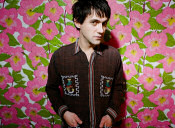 Gay & lesbian video clips all night
Gay & lesbian video clips all night
Video clip is one of the homes of queer visuality. A collection of clips, which was presented at the Queer Lisboa festival under the heading All the bodies, all the sexes and which explores bodes and the space around them. The “shorts” were done, among others, by John Cameron Mitchell and Greg Arraki. The selection includes songs from the alternative pop-rock scene as well as mainstream voices with clear connections to the queer universe.
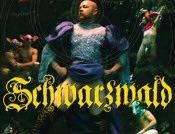 Projection of music movie Schwarzwald (DE)
Projection of music movie Schwarzwald (DE)
SCHWARZWALD: The Black Party® The Movie You Can Dance To is a first of its kind. It’s a film designed to be screened in a format that encourages audiences to dance. Starring Buck Angel, the world famous FTM transsexual porn star, and featuring a cast of performance artists, exhibitionists, fetishists and over 5,000 leather clad dancers. Stylistically, it combines elements of Grimm’s fairy tales, Expressionist silent films, and \"arty\" porn filtered through heavy use of Jungian allegorical archetypes. The film is scored to a continuous dance mix and intended to take audiences on a phantasmagorical trip.
 MC Jarda & Karaoke Ken
MC Jarda & Karaoke Ken
Festival karaoke with films hits!
DJ Berry (Valentino Red bar)
Tak trochu jiné zakončení festivalu s veselým a hravým DJ Berrym, českými hity a oldies
S lístkem do kina nebo pozvánkou vstup zdarma.
 Představení Divadla v Celetné
Představení Divadla v Celetné
Příběhy lidí, kterým není co závidět.
Děj dramatických miniatur se odehrává ve skandinávských reáliích a jejich hrdinové - „bezkyslíkatí“ - gayové, lesby, bezdětné manželské páry, lidé nemocní AIDS…. – tu před našimi zraky zápasí se svým osudem. Villqist dokázal s nesmírnou citlivostí přiblížit jejich intimní svět - ke slovu přicházejí jejich skryté, nesmělé pocity, jejich láska i strach.
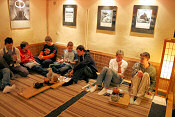 Setkání náctiletých gayů
Setkání náctiletých gayů
Určitě jste se už setkali s nějakým gay filmem, třeba zrovna na Mezipatrech, ale co je to vlastně gay film? Definovali byste to pouze jako film, který se točí kolem homosexuality jako takové, nebo stačí, aby byla homosexuální minimálně jedna postava? Či snad dokonce stačí jen to, aby byl homosexuální jen herec či autor? Má smysl točit filmy s gay tématikou a dokáží zaujmout i heterosexuální část populace? Máte nějaký svůj neoblíbenější gay film a myslíte si, že spektrum žánrů s gay tématikou je dostatečné? Viděli jste třeba nějaké gay sci-fi? :-)
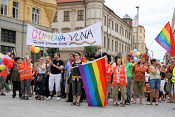 Discussion Queer Café
Discussion Queer Café
Barbora Kárníková, Jolana Navrátilová and guests: Andy Jochmann and Mirek Zajdák
Queering the pride...
The beginning of holidays in Brno saw the first bigger parade of gays, lesbians, bisexuals, trans and other queer people – called Rainbow Wave 2008 – Queer parade Brno. In spite of initial mistrust and in spite of neo-Nazi threats and protests of some Christians more than 600 participants came. Will the tradition in the Czech Republic go on?
What are the past and present goals and meanings of pride parades? What changed from Stonewall to Moscow? How do the activities in post-socialist countries differ? Are we proud to be queer? Come to discuss the development and purpose of pride parades to queer café.
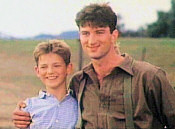 Discussion Queer Café
Discussion Queer Café
Michael Matthew Kaylor
Death as Device: For a Lost Soldier in the Classical Tradition
Greco-Roman iconography abounds in imagery of the dying youth, whether
his death was initiatory (the boy reborn into the man) or tragic (the
boy not fated to live into adulthood). Such imagery was profoundly
martial and pedagogical, and nostalgic for the transitory. In the Dutch
film For a Lost Soldier
(1994), directed by Roeland Kerbosch, such iconography is inverted
through tracing it from the boy’s coming-of-age perspective, with the
departure of the Canadian soldier serving to validate why the death of
the character, even if it is only symbolic, is a vital aesthetic device.
Read more: Death as Device: For a Lost Soldier in the Classical Traditi
 Discussion Queer Café
Discussion Queer Café
Olga Pechová, Department of psychology on FF UP Olomouc
Trans-history or how sex changed
Change of sex for someone means a process of initiation, but for others it is a step against nature or manifestation of conformity to gender stereotypes. Although this topic attracts attention of media, only a few people are familiar with the real history of transsexual community. The beginning of sex changes in the interwar Germany, the trans scene in the USA and the lives of trans people in the Czech Republic will be talked about by the Olomouc-base psychologist Olga Pechová.
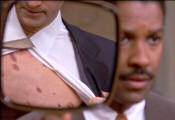 Discussion Queer Café
Discussion Queer Café
Jeffrey Alan Vanderziel, Department of english on FF MU Brno
With the advent of AIDS as an issue in films about the GLBT community,
how does the “expectation of the death of characters with AIDS” play to
or push back against the stereotype of gay and lesbian characters
having to die that has been so prevalent in mainstream Western films
since the 1950s (e.g. Rebel Without A Cause, The Children’s Hour, to
name but two of the most well-known examples)? Films that may be
discussed include Philadelphia (USA, 1993), Zero Patience (Canada,
1993) and Angels in America (USA, 2003).
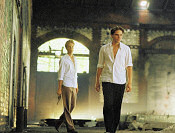 debate over this-years’ films
debate over this-years’ films
A good film works. It comes back to us, forces us to think over it; the
experience a screening hall changes in time and so do our readings. We
have selected five diverse films from the programme and asked two young
film critics to debate over them at the end of the festival with the
audiences. The films you can debate on are: Avant que j'oublie (str.
xy), Triple X Selects: The Best of Lezsploitation, Love in Thoughts,
Odete and I am My Own Wife.
The discussion hosts are: in Brno Jakub Macek (Metropolis), in Prague Kamil Filla (Cinepur, aktualne.cz).
What are G/L studies? Why are they here?
Panel discussion exploring the concept, sense and perspectives of a
scientific reflexion on homosexuality, commonly called gay and lesbian
studies. The participants, Martin Putna, Věra Sokolová and Franz
Schindler, have worked on this field systematically on a long-term
basis.
Attention will be brought to issues to be dealt with in more detail at the Homosexuality in the Czech Lands an the Humanities Conference which will take place in March 2009 at the Faculty of Humanities of the Charles University. The panel discussion will be moderated by Pavel Himl.
 Discussion on the theme of queer lifestyle
Discussion on the theme of queer lifestyle
Kristýna Ciprová, Depatrment of gender studies FHS UK Praha
The term queer finally has reached the Czech country. Queer films, queer people and queer style appears. Or is it a new name for films, people and style that have already been here? In what context is “queer” used? Is it a term or a concept? What exactly does it mean? Who uses it and why? Can we speak about queer lifestyle in the Czech Republic? Who is creating it and how? Can queer people really be found here? These questions will be answered by queer theorists and people who take part in forming the contemporary queer lifestyle in the Czech Republic.
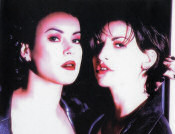
Presentation by Manuela Kay. Based on the book „Out im Kino – A Guide to Queer Cinema“
The presentation is a short overview of queer cinema and of the portrayal of queer characters on the screen during the last 100 years of the history of cinema. The presentation concentrates on volatile issues such as homophobia in film while covering the milestones in queer cinema as well as giving behind-the scenes look at the scandals and gossip in the movie business. Special attention will be paid to film sensations such as the first time inside a “real” gay bar, the first cheek-to-cheek dance between two women – to name just a few.
Appr. duration of the presentation: 100-110 min. of which 50% is made up of film clips, either in the English version or with English subtitles.
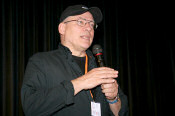 Sestřih ukázek s osobním komentářem režiséra
Sestřih ukázek s osobním komentářem režiséra
Již na 80 filmů natočil německý režisér Rosa von Praunheim od jeho prvního snímku v roce 1967. Pro Mezipatra, na kterých se promítnou jeho čtyři filmy, se rozhodl připravit sestřih krátkých ukázek ze svých snímků a okomentovat je. Mistr se tak bude divákům prezentovat sám za sebe, tak jak vidí sám sebe i svou tvorbu. To ale nebude jediné setkání s tímto pozoruhodným autorem. Poté následuje promítání jednoho z jeho nejpovedenějších dokumentárně hraných snímků Svou vlastní ženou, po němž bude následovat debata s režisérem.
 Discussion Queer Café
Discussion Queer Café
Kateřina Kolářová, FHS UK Praha
Both AIDS and HIV serostatus have been predominantly discussed in relation to numbers and statistics. In contrast to this tendency, there seems to be a marked urge to rely of photographs and other visual material to represent AIDS/HIV and its “human dimension”. But we need to ask what are the faces that we use to represent AIDS/HIV. What is “the face” of AIDS? And are there any angers to such strategy of representation?
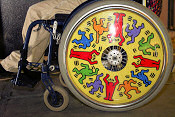 Discussion Queer Café
Discussion Queer Café
Robert McRuer
Contemporary crip representations expose and critique discourses of tolerance. Robert McRuer examines the antisocial thesis that is well known in queer theory but has no clear analogue in Disability Studies. What might antisocial theory have to offer Disability Studies and how might crip theory be more central to larger contemporary critiques.
Prof. Robert McRuer lectures literature and cultural studies at The Georgie Washington University in Washington D.C. He focuses mostly on GLBT issues and reciprocal relation between sexuality and „disability“. He is the author of the influential „Crip Theory“ (Crip Theory, 2006).
Read more: Bad Education: Crip Representation and the Limits of Toleran
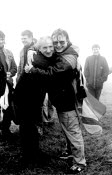 Dokumentární výstava
Dokumentární výstava
Především dvě desetiletí hnutí gayů a leseb v ČR za rovnoprávnost mapuje putovní výstava zahrnující fotografie, dobové dokumenty, gay časopisy i přenos ze sněmovny Parlamentu ČR.
Výstavní panely se zaměřují na postavení gayů a leseb ve světě od antiky po 19. století, ukazují situaci v českých zemích za Rakouska-Uherska, první republiky, nacismu i komunismu. Poslední část se věnuje době po listopadu 1989, kdy v ČR vznikaly gay a lesbické organizace působící na veřejné mínění i na politiky.
 Prodejní výstava – umělecký jarmark
Prodejní výstava – umělecký jarmark
„Teplé nebe? peklo? ráj?“ je tématem první prodejní výstavy Mezipater, pokus o jakýsi umělecký jarmark, který slouží také, nebo především, jako místo setkání ... Setkání umělců s návštěvníky ... Setkání s obrazy, fotografiemi, sochami, grafikami, malbami, ... Setkání při sobotní procházce Brnem, městem Mezipater...
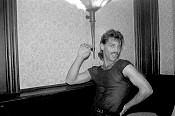 Photographs from 1983 - 1985
Photographs from 1983 - 1985
T- Club was, until the beginning of 90s, a renowned night club in Prague. It was in an underground area in the center of the city but hidden; one of two half-official gay clubs in Prague.
“The darkest place is under the candlestick” - that's what the "world" where I suddenly found my-self seemed to me. A Prague, Czechoslovakian, Eastern European and foreign gay community used to meet here in a family atmosphere. Sardonic laughter and real tears. Profound talks and superficial coquetry. One-night relationships and life-long love. Handsome young men, beautiful young women, twisted “B-listers” and respectably looking gentlemen who whisked from their fami-lies. Women football players, waiters, taxi drivers and probably also secret policemen. Shop assis-tants from the drug store, a postmaster, and a train-gang boss. Girls from Yalta used to finish their night work here. The clientele of two homosexual clubs in Prague was almost stable. Even those who "belonged to the family" could perform. Peeping Toms were not welcome, the bouncer didn't let everyone in. Down there everyone knows everyone. Age is not an illness, age is tolerated. - In-clined arch, Mrs Bulbous, Glasswoman, Lemon, Rattle bag, Backpack, Mrs. Bleble - all these were here almost every day...
I could never really photograph a true “documentary”. There were still a lot of those who wished to protect their "everyday" identity and they didn't like to be associated with T- club. And so T- Club on the photographs seems to be a place of “everlasting carnival”.
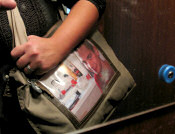 Výstava Martiny Uhlířové
Výstava Martiny Uhlířové
kolekce textilních tašek na míru. pro mé kamarády. co už mám dělat, mám je ráda, jsou moji. nebe, peklo i ráj. mají tato tři slova přimíchaná v povahách, v temperamentu, v náladách i ve vkusu. jejich teplota je bonus. ani výhoda ani nevýhoda. jsou moji moji. nechtěla bych je měnit.
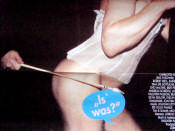 A selection of posters reveals a lot, not just about the content of the
films themselves, but also about graphic art of several decades. Among
them there are lascivious and mysterious images of the male body, but
also at first unrecognizable elements. They, however, reveal the mood
and sometimes also the plot of films. Some are literally provocative;
others seem distant or very simple. As with all the work of Rosa von
Praunheim, one of the most renowned German directors, it is interwoven
with impressive and unusual stories and people; likewise his graphic
work is presented externally – very personally and self-ironically.
A selection of posters reveals a lot, not just about the content of the
films themselves, but also about graphic art of several decades. Among
them there are lascivious and mysterious images of the male body, but
also at first unrecognizable elements. They, however, reveal the mood
and sometimes also the plot of films. Some are literally provocative;
others seem distant or very simple. As with all the work of Rosa von
Praunheim, one of the most renowned German directors, it is interwoven
with impressive and unusual stories and people; likewise his graphic
work is presented externally – very personally and self-ironically.
Read more: Exhibition of the Film Posters of Rosa von Praunheim
Zahájení festivalu
Projekce vybraných dílů televizního pořadů Q a následná debata
Zobrazování sexuálních menšin v českých médiích se v posledních dvou desetiletích rapidně proměnilo. Jednou z důležitých změn je i to, že LGBT lidé se stali nejen subjekty zájmu sdělovacích prostředků, ale také i aktivními tvůrci svého obrazu. Česká queer média zaznamenala překotný rozvoj, v průběhu kterého byly tištěné časopisy nahrazeny elektronickými médii. O současných trendech v této oblasti budou diskutovat účastníci diskuse pořádané v rámci olomouckých ozvěn Mezipater.
Přednáška
Po většinu dvacátého století bylo na homosexualitu pohlíženo jako na nemoc. Dnes již patří tento názor minulosti, ale stále je tu otázka, zda přináší život pro homosexuální lidi větší obtíže než pro ostatní. Nad různými pohledy na gaye a lesby a nad tím, jak se změnilo chápání homosexuality, se ve své přednášce zamyslí olomoucká psycholožka PhDr. Olga Pechová.

